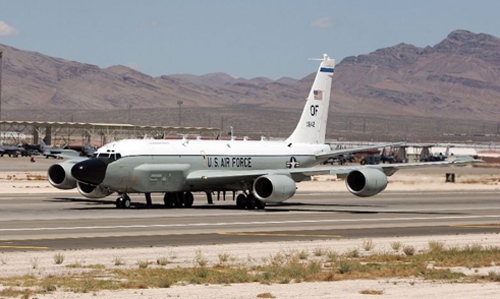Russia dismisses new US charge over air incident
Moscow: Russia rejected Saturday a new claim that one of its jets had intercepted a US reconnaissance plane over the Baltic in an "unsafe" manner, and accused Washington of sending "spy-planes" into its airspace.
US authorities said they were "very concerned" after the mid-air standoff Friday, the latest incident fuelling tension between the former Cold War foes.
"On April 29, 2016, a US Air Force RC-135 aircraft flying a routine route in international airspace over the Baltic Sea was intercepted
by a Russian SU-27 in an unsafe and unprofessional manner," said a statement by the US European Command (EUCOM).
"There have been repeated incidentsover the last year where Russian military aircraft have come close enough to otherair and sea traffic to raise serious safety concerns, and we are very concerned with any such behaviour.
"The US aircraft was operating in international airspace and at no time crossed into Russian territory. This unsafe and unprofessional air intercept has the potential to cause serious harm and injury to all aircrews involved.
"More importantly, the unsafe and unprofessional actions of a single pilot have the potential to unnecessarily escalate tensions between countries."
But Moscow dismissed the incident, insisting it "respects international airsafety rules", and accused Washington of sending "spy planes" to Russia.
"We are starting to get used to the Pentagon's insults about alleged 'non-professional maneouvres' by our jets when they intercept American spy planes on Russia's frontiers," said Russian defence ministry spokesman, General Igor Konachenkov.
These "American reconnaissance planes try to sneak up to the border with their transponders off," which makes them invisible to other planes, he said in a statement.
"As a consequence, (Russian) airdefence forces have to send jets to visually identify this type of plane and their identification number," he said.
"The US air forces have two solutions: either they do not fly close to our borders, or they turn their transponder on so that our radar can identify them by objective monitoring," he added.
The last such incident was on April 17, when Russia's defence ministry said one of its SU-27s had been dispatched to identify an "aerial target travelling toward the Russian border at high speed."
That incident came shortly after Russian aircraft repeatedly buzzed the USS Donald Cook, including one incident in which a Russian Su-24 flew 30 feet (nine meters) above the war ship in a "simulated attack profile," according to the US military's European Command.
Ties between Russia and the West have plunged to their post-Cold War nadirover Moscow's 2014 annexation of the Crimean peninsula from Kiev and its support for separatist rebels in eastern Ukraine.
Related Posts

